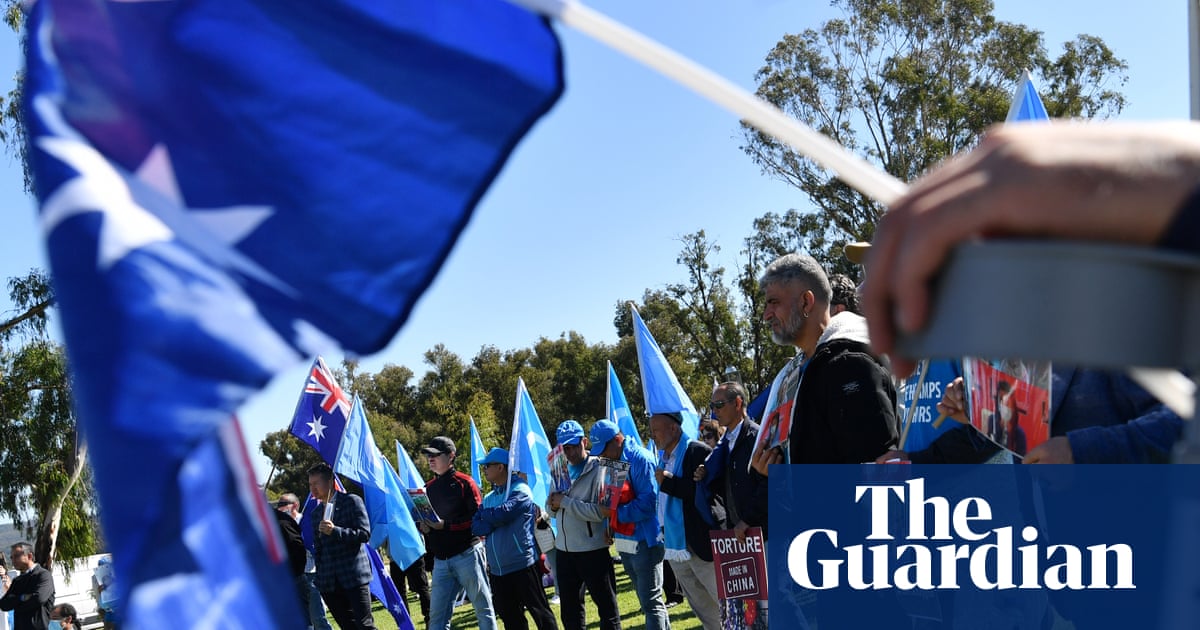
A top union leader has called on the Morrison government to urgently introduce laws to prevent Australian businesses from “profiting by importing goods made by slavery”, as the push gains support from across the political spectrum.
The president of the Australian Council of Trade Unions, Michele O’Neil, told Guardian Australia it “should appall all Australians that there is no ban on the importation of goods produced by forced labour”.
The government is facing growing pressure – including from its own MPs – to join international efforts to curb forced labour practices, including in Xinjiang in western China, a move that looms as another potential flashpoint in the tense relationship with Beijing.
China’s commerce ministry on Thursday launched a formal challenge against Australian tariffs on several Chinese products, mirroring the Morrison government’s actions through the World Trade Organization against imposts on Australian barley and wine.
The Biden administration, meanwhile, is poised to announce moves targeting some solar products made in Xinjiang, Bloomberg News reported on Thursday. The US move could have big implications for the global supply of polysilicon, a material used in solar panels and semiconductors.
China denies all allegations of forced labour in Xinjiang or of human rights abuses against Uyghur Muslims and other minorities, but the US and several western parliaments have labelled the Chinese government’s actions in the region as “genocide”.
Calls are growing for Australia to take a stronger stand against human rights abuses, wherever they occur. Labor’s foreign affairs spokesperson, Penny Wong, said the toughening of Australia’s importation laws was “a critical first step”.
Wong also argued the government should review its own multi-billion-dollar procurement programs and give the Australian Border Force (ABF) extra resources to investigate the origins of imported products.
Sophie McNeill, a researcher for Human Rights Watch, said the government needed to show “political will” to act, arguing Australia “has been lagging behind many of our like-minded countries on the issue of Uyghur forced labour”.
The Australian government is weighing up a bipartisan blueprint for reforms, including amending the Customs Act to prohibit the import of any goods made wholly or in part with forced labour, regardless of geographic origin.
The Coalition-chaired foreign affairs, defence and trade legislation committee has also proposed that the ABF be given new tools to target specific goods, companies or regions that have a particularly high risk of being associated with forced labour.
Advocates say this idea – similar to a measure that has operated in the US for years – would designate targeted goods as having been made with forced labour unless companies can prove otherwise.
The committee recommended that “once the issuance of such orders is possible, the Australian Border Force should immediately consider issuing an order, at a minimum, for cotton sourced from Xinjiang”.
The ACTU’s O’Neil said the government needed to act quickly to implement what she described as “a very clear and achievable set of recommendations”.
“The Morrison government has the responsibility to now implement them and ensure that Australian businesses aren’t profiting by importing goods made by slavery,” she said.
“We’re extremely concerned about forced labour and other human rights abuses in supply chains. Australia must act immediately to stop directly contributing to slavery.”
Wong said the Coalition had blocked amendments to the Modern Slavery Act when it was introduced three years ago, leaving the nation with “more of a set of suggestions than laws with bite”. Critics say those laws are weak because they don’t carry fines for breaches.
The legislation that passed the parliament in 2018 is also limited in its scope, with only Australia’s biggest companies – those with annual revenue of more than $100m – required to submit annual statements on the steps they are taking to address modern slavery in their supply chains and operations.
The government has left the door open to toughening up the modern slavery laws but has not given any indication it will fast-track a long planned review of the legislation.
Wong called for better research into how and where forced labour occurs, the use of technology to help track supply chains, and offering tools to help consumers understand which goods are likely to have come from forced labour so they can make an informed choice.
“Labor would go further. We would deploy Austrac, the authority responsible for policing financial crimes, and we would make combatting modern slavery a diplomatic priority,” Wong said.
“We would also ensure the federal government leads by example, comprehensively and publicly reviewing the billions of dollars of procurement it undertakes on behalf of Australians. This should act as a blueprint for state and territory governments to also review their supply chains.”
In an attempt to maintain momentum for the government to act, the independent senator Rex Patrick introduced a bill to the Senate on Thursday that would implement a ban on the importation of goods that are produced by forced labour.
Patrick said the supply of goods produced with slave labour was “an immediate problem of the utmost gravity” and any delays in passing the bill “would be unconscionable”.
The minister for home affairs, Karen Andrews, was contacted for comment but her office referred the questions to the ABF, whose spokesperson said: “The government is considering the committee’s final report and its recommendations.”
https://www.theguardian.com/australia-news/2021/jun/25/unions-join-call-for-australian-law-prevent-profit-slavery-forced-labour-xinjiang-china

